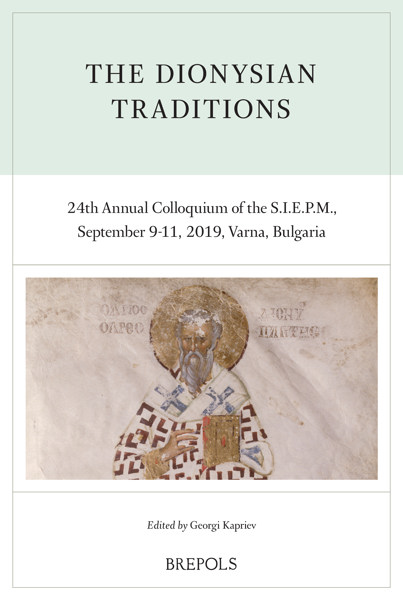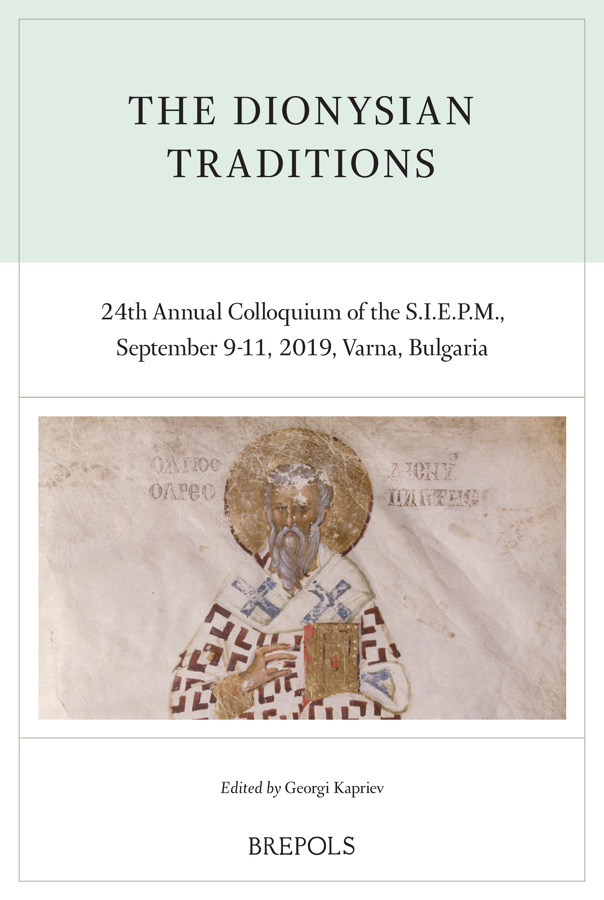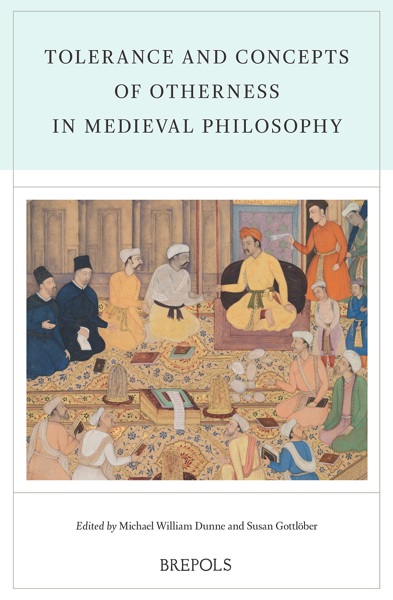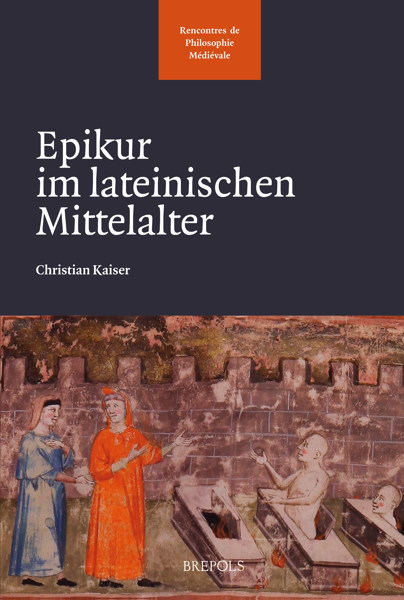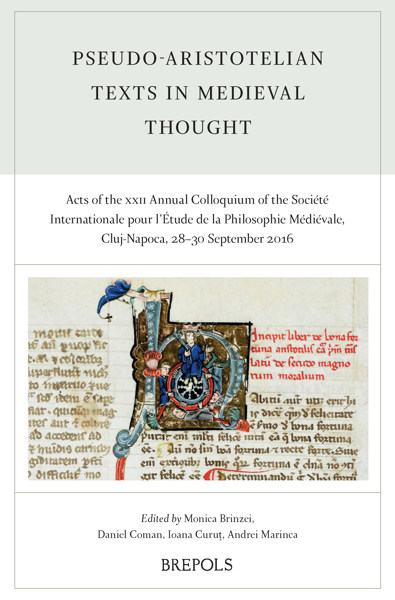
The Dionysian Traditions
24th Annual Colloquium of the S.I.E.P.M., September 9-11, 2019, Varna, Bulgaria
Georgi Kapriev (ed)
- Pages: xx + 392 p.
- Size:156 x 234 mm
- Language(s):English, German
- Publication Year:2021
- € 65,00 EXCL. VAT RETAIL PRICE
- ISBN: 978-2-503-59339-5
- Hardback
- Available
- € 65,00 EXCL. VAT RETAIL PRICE
- ISBN: 978-2-503-59340-1
- E-book
- Available
A large part of the analyses on Dionysius research develop a new approach to post-medieval culture and a clearly defined commitment to the current problems of thought and social life.
“(…) the editors and contributors should overall be congratulated on putting together what I sincerely hope will become a landmark volume for the study of later-medieval and early-modern material culture in the European context.” (Ben Jervis, in Medieval Archaeology, 66/2, 2022, p. 532)
“My wish is that the excellent contributions of this volume can unfold their effects throughout the whole dimension of the history of medieval and modern philosophy.” (Luca Parisoli, in The Medieval Review, 03/05/2023)
« Le point le plus frappant de cet ouvrage tient sans doute dans la diversité des réceptions de la pensée dionysienne et de la mise en évidence de certaines traditions de réception moins connues, ainsi Gérard de Csanád, Fortunio Liceti ou encore le contexte byzantin de la question posée dans la contribution de G. Kapriev, « existe-t-il une vraie interprétation de Denys ? ». Il est certain qu’en tout cas aucun des thèmes majeurs de la pensée de Denys n’a été laissé dans l’ombre. » (Isabelle Moulin, dans Revue des sciences religieuses, 99/1-2, 2025, p. 263)
The present volume contains contributions by Henryk Anzulewicz (Bonn), David Bradshaw (Kentucky), Maria Burger (Bonn), Gergana Dineva (Sofia), Mark Edwards (Oxford), Wouter Goris (Bonn), Filip Ivanovic (Donja Gorica), Georgi Kapriev (Sofia), Mikhail Khorkov (Moscow), Theo Kobusch (Bonn), Ernesto Sergio Mainoldi (Florence/Lecce), Isabelle Mandrella (Munich), Smilen Markov (Veliko Tarnovo), Günther Mensching (Hannover), Claudiu-Marius Mesaroș (Timșoara), Lars Reuke (Cologne) and Andreas Speer (Cologne).
Prof. D.Sc. Georgi Kapriev teaches philosophy at the Sofia University “St. Climent Ohridski” in Bulgaria. He has studied in Cologne and Paris. From 2002 to 2012 he was the President of the Commission “Byzantine Philosophy” of the S.I.E.P.M. He is also Co-Founder of the European Graduate School for Ancient and Mediaeval Philosophy (EGSAMP). He is the editor of twenty-nine editions and author of twenty-seven books. He is also editor and co-author of the section on Byzantium in the volume Byzanz. Judentum of the Grundriss der Geschichte der Philosophie (Basel: Schwabe, 2019).
The volume contains the contributions of the 24th Annual Colloquium of S.I.E.P.M. "The Dionysian Traditions", which took place in Varna, Bulgaria from September 9 to 11, 2019. The theme of the colloquium is not coincidentally related to the topic of the 9th Annual Colloquium "The Dionysius Reception" (1999 in Sofia, Bulgaria). The aim was to consider the continuity of research and to ensure its new dimensions. The colloquium demonstrated the multifaceted, advanced development of Dionysius research over the past twenty years. The Corpus Dionysiacum exerted an enormous influence on the Christian cultures of the European Middle Ages, which also had and still has an impact on modern times. Focal points of the medieval - Latin and Byzantine - Dionysius traditions are discussed in detail, previously undiscussed topics and perspectives are presented. A large part of the analyses develop a new approach to post-medieval culture and a clearly defined commitment to the current problems of thought and social life. The profoundly analyzed questions and topics convincingly open new horizons for today's science.
Georgi KAPRIEV, Preface
His Eminence Metropolitan JOHN of Varna and Veliki Preslav, Welcoming Address
Theo KOBUSCH, Complicatio und explicatio. Das ontologische Modell des Neuplatonismus
Mark EDWARDS, Dionysius and the Athenian School of Neoplatonism
Ernesto Sergio MAINOLDI, The Place of the Corpus Dionysiacum in the Development of the Byzantine Canon of Ontology
David BRADSHAW, The Divine Processions and the Divine Energies
Smilen MARKOV, The Dionysian Traditions in 9th century Byzantium
Claudiu MESAROȘ, The Reception of the Dionysian Corpus in the Deliberatio by Saint Gerardus of Cenad
Maria BURGER, Die Rezeption der Nomina divina im Sentenzenkommentar Alberts des Grossen
Henryk ANZULEWICZ, Illumination und Emanation in den Dionysius-Kommentaren des Albertus Magnus: kognitive und ontologische Aspekte
Lars REUKE, Nothing Compares 2U. Ps.-Dionysios, Albert the Great and Fortunio Liceti on Divine Life and the Use of Analogy
Andreas SPEER, Reading Aristotle through Dionysius. New Perspectives on Thomas Aquinas’ Epistemology
Wouter GORIS, Continentia unitiva. Duns Scotus and the Neo- platonic Metaphysics of Unity
Isabelle MANDRELLA, Sic arguit magnus Dionysius. Nicolaus Cusanus und Dionysius Areopagita
Mikhail KHORKOV, Kontroversen um die mystische Theologie des Pseudo-Dionysius Areopagita in der Erfurter Kartause im 15. Jahrhundert
Gergana DINEVA, The Symbol as Boundary Within the Teach- ings of Pseudo-Dionysius the Areopagite
Filip IVANOVIC, Law, Order and Equality in Dionysius
Gunther MENSCHING, Zur Bedeutung des dionysischen Denkens fur die politische Tradition Europas
Georgi KAPRIEV, Gibt es eine richtige Dionysios-Interpretation?
Indexes
Index of Manuscripts
Index of Names
